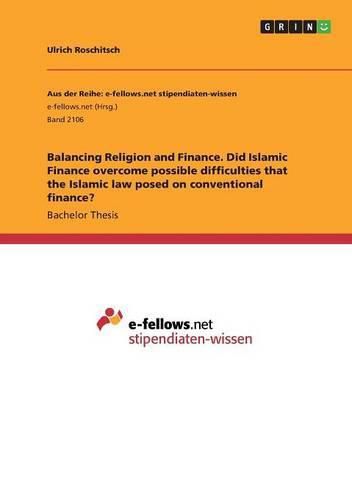Readings Newsletter
Become a Readings Member to make your shopping experience even easier.
Sign in or sign up for free!
You’re not far away from qualifying for FREE standard shipping within Australia
You’ve qualified for FREE standard shipping within Australia
The cart is loading…






Bachelor Thesis from the year 2016 in the subject Economics - History, grade: 1,3, University of Mannheim (Fakultat der Rechtswissenschaften und VWL), language: English, abstract: Since the mid-1970s, an industry growing at considerable pace in the Islamic world is gaining market shares all over the world in countries with sufficient Muslim populations. This Islamic Finance industry claims to act in line with the ethical and practical principles set forth in the Qu'ran and the Shari'ah, thus appealing to Muslim and non-Muslim clients alike who search for viable alternatives to conventional financial products. As explained, the first beginnings of this phenomenon can be traced well back into the 1970s when the first Islamic Banks started operating in Egypt and Jordan. In the past decades, a vast amount of research has been published - empirical and theoretical - to review the impacts of Islamic Finance on the financial markets of the Islamic world. These works, to a great deal inspired by the enormous need of the industry for quantitative and qualitative research, all dealt with questions of comparative efficiency of conventional and Islamic Finance, the demand for Shari'ah-compliant financial products, the actual genuineness, or authenticity, of the industry, etc. However, only a very small portion of these research works dealt with the question whether or not the Islamic world actually needs Islamic Finance. At first, this might seem as a trivial question (if there was no need for Islamic Finance, there would not have been this substantial growth). But at second thought, one realizes the associations that come which come with the question of raison d'etre: Why did Islamic Finance emerge? Does it add an economic value to its markets? And most importantly, is it - so far - successfully reaching its goals? To my understanding, the works that deal with this big-picture analysis, are thin on the ground. Therefore, this work shall take a first step at putting Isl
$9.00 standard shipping within Australia
FREE standard shipping within Australia for orders over $100.00
Express & International shipping calculated at checkout
Bachelor Thesis from the year 2016 in the subject Economics - History, grade: 1,3, University of Mannheim (Fakultat der Rechtswissenschaften und VWL), language: English, abstract: Since the mid-1970s, an industry growing at considerable pace in the Islamic world is gaining market shares all over the world in countries with sufficient Muslim populations. This Islamic Finance industry claims to act in line with the ethical and practical principles set forth in the Qu'ran and the Shari'ah, thus appealing to Muslim and non-Muslim clients alike who search for viable alternatives to conventional financial products. As explained, the first beginnings of this phenomenon can be traced well back into the 1970s when the first Islamic Banks started operating in Egypt and Jordan. In the past decades, a vast amount of research has been published - empirical and theoretical - to review the impacts of Islamic Finance on the financial markets of the Islamic world. These works, to a great deal inspired by the enormous need of the industry for quantitative and qualitative research, all dealt with questions of comparative efficiency of conventional and Islamic Finance, the demand for Shari'ah-compliant financial products, the actual genuineness, or authenticity, of the industry, etc. However, only a very small portion of these research works dealt with the question whether or not the Islamic world actually needs Islamic Finance. At first, this might seem as a trivial question (if there was no need for Islamic Finance, there would not have been this substantial growth). But at second thought, one realizes the associations that come which come with the question of raison d'etre: Why did Islamic Finance emerge? Does it add an economic value to its markets? And most importantly, is it - so far - successfully reaching its goals? To my understanding, the works that deal with this big-picture analysis, are thin on the ground. Therefore, this work shall take a first step at putting Isl